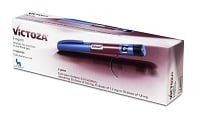Novo Nordisk ($NVO) is nearing the weight-loss finish line. Its obesity-fighting dose of liraglutide is up for debate by the FDA's expert advisors this week, and staff reviewers issued largely positive comments in documents filed Tuesday morning.
Now dubbed Saxenda, the drug could get an FDA green light next month, in culmination of several years of study in weight loss. But the FDA's decision is far from the final hurdle. A new generation of obesity-fighting meds has failed to make much headway in the market, dogged by skepticism among doctors and payers.
So, if the FDA comes through, the rest will be up to Novo Nordisk's marketing machine.

The Danish drugmaker has been expanding its U.S. sales team and prepping for a weight-loss launch for more than a year. And Novo's reps have boosted liraglutide to blockbuster sales already--under the Victoza name, as a type 2 diabetes treatment.
Novo figures--and analysts agree--that the company will have an edge over other obesity fighters because, a., doctors are well versed in Victoza use, and b., its reps have long-established relationships with the physicians likely to prescribe Saxenda.
Sales reps will have some strong stats to tout. The 3 mg dose of liraglutide beat the agency's threshold for weight loss in potential obesity drugs, the FDA review states. More than 60% of patients lost at least 5% of their body weight, and almost one-third lost more than 10%, according to pooled data from four clinical trials. In both cases, Saxenda beat placebo by a wide margin.
There are some safety questions, though. The agency reviewers appear most concerned about potential risks of pancreatitis, with cases cropping up in human trials, and thyroid cancer, based on malignancies in mice. They're also concerned about cardiovascular effects, because of heart rate increases seen in some liraglutide patients. But the reviewers also noted that Novo is conducting a cardiovascular outcomes study on Victoza, which should yield data useful for gauging Saxenda's effects on the heart.
If Saxenda makes it onto the market, it will face a couple of recently approved weight loss meds: Arena Pharmaceuticals' ($ARNA) Belviq, now marketed by Eisai, and Vivus' ($VVUS) Qsymia. Despite early optimism--and blockbuster revenue estimates--the drugs have scrambled to gain sales since their approvals in 2012. A third drug from Orexigen ($OREX) could win the FDA's blessing as early as this week.
But the contest is as much about creating a market as it is about competing with rivals. Consider Qsymia and Belviq, which are now expected to bring in $141 million and $118 million by 2016, respectively.
Payers have been reluctant to cover obesity drugs in the past, so the companies have had to lobby hard for reimbursement. Out-of-pocket costs for patients--even those whose insurance covers the pills--have hampered uptake, too. And then there's the stigma attached to obesity. Doctors tend to push lifestyle changes over meds, and patients sometimes blame themselves--or friends and family do it for them.
But those struggles may end up paying off for latecomers to the market, analysts say. They've laid the groundwork for a bigger obesity-drug market, by changing some doctors' attitudes and winning over about half of private payers.
"Being third is absolutely a good thing," Piper Jaffray analyst Charles Duncan told Bloomberg about Orexigen's potential entrant. "Being first was not good because there was virtually zero reimbursement for drug-based therapy before. There needed to be a kind of change in the attention toward obesity and the usefulness of a drug for that."
- read the Bloomberg story
- get the FDA briefing document (PDF)
Special Report: The top 10 best-selling diabetes drugs of 2013